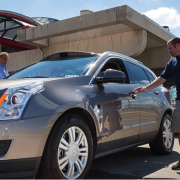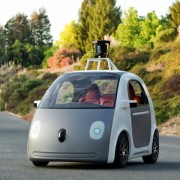News Roundup: A Semi-Autonomous Motorcycle, Driverless Cars Hit Public Roads in England, and More
Jennifer van der Kleut
A roundup of some of the most interesting news to come out of the driverless, connected-car world this week:
BMW says helmets won’t be needed with their self-balancing motorcycle
While most of the world is focused on semi-autonomous features that can make cars safer, BMW has been quietly focusing on a semi-autonomous motorcycle. This week, the auto manufacturer unveiled its design for the Vision Next 100 bike, with features like semi-autonomous steering and self-balancing wheels. Instead of a helmet, the bike will come with a visor that has an internal display super-imposed over the road and surrounding environment. The bike’s connected-vehicle system will give alerts about obstacles and risks on that display. BMW says the self-balancing wheels are so effective, a rider won’t even need to put their feet down on the ground when they stop, and it will be so hard to crash the bike, traditional helmets and padded, protective clothing won’t be necessary. Read more about the Vision Next 100 on CNNMoney.
Driverless cars tested on UK public roads for the first time
As Britain keeps moving toward its goal of having driverless cars on the road by 2020, a test car hit the public streets of Milton Keynes for the first time on Tuesday. Traveling at about 5 km per hour, the small two-seater driverless pod car navigated the streets of the largely pedestrianized southern town, stopping for people that crossed in front of it and safely turning corners. The pod car, heavily adapted from a compact Renault car, was developed by the Oxford University spin-out Oxbotica. Read more about the driverless car’s first public trip from Reuters.
Lots of driverless news out of California this week
According to news outlets like Ars Technica, Wall Street Journal and Elektrek, things are really heating up in California, where the number of companies that have been issued permits to test autonomous vehicles has just climbed to 17, up by three just since the end of summer. The two newest permits were issued to Wheego, an electric vehicle powertrain engineering company, and Valeo, a familiar name in the industry as a longtime tier-one automotive supplier. Also recently, Chinese tech firm Baidu received a testing permit. In other California news, Elektrek was one of the first to spot prototypes of Google’s long-awaited self-driving Chrysler Pacific mini-vans in Mountain View last weekend, and published a few somewhat grainy photos. Read more recent industry news from Ars Technica.
Image: Vision Next 100 semi-autonomous motorcycle prototype, by BMW.



